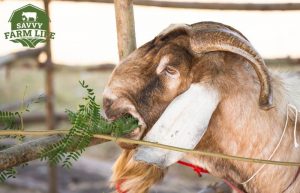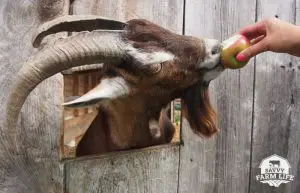What You Should and Shouldn’t Feed Your Goats
Goats are famous for eating everything, from tires to wood boards to even metal cans. But is that really true? Are there some things that could be dangerous to your goats’ health if digested?
So, what can, and can’t goats eat? Goats are browsers rather than grazers, so this means they prefer eating vegetation in the form of twigs, leaves, shrubbery, and bark, or anything they may find at eye-level. They can also safely eat fruits, vegetables, and whole grains in moderation. Here is a list of foods and items that goats shouldn’t eat:
- finely ground grains
- meat
- avocados
- cherry pits
- potatoes
- chocolate
- any synthetic or artificial material (rubber, metal, fabric, etc.)
The truth is there are many things that don’t belong in your goats’ stomachs that will cause them a world of digestion problems and unnecessary pain. All animals come with specific dietary needs, and goats are no different. To learn more about what goats should and shouldn’t eat, keep reading!
A Goat’s Natural Diet
Goats are herbivorous ruminants. This means their digestive anatomy is specialized for consuming plants, especially those with high fiber content, and they may often be seen “chewing the cud,” or regurgitating stomach content and chewing it up again. They also have a special type of stomach with four compartments and an addition to the digestive tract called a cecum. These unique anatomical features help goats break down roughage into the nutrients their bodies need to survive and thrive.
Goats are known as browsers, meaning they tend to look for food at eye level rather than looking down for grass. Because of this, goats tend to prefer vegetation like leaves, twigs, shrubs, and weeds compared to fine pasture grass that a sheep would choose.
Because of their browsing tendencies, goats are one of the few livestock animals that can thrive in a wooded setting. To learn more, check out my article Can Goats Live in the Woods?
I often throw my tree clippings into the goat pen for the goats to munch on since they prefer that form of forage so much. That being said, there are certain plants and weeds to watch out for, as they can be poisonous to your goats. Watch out for common plants like Hemlock, Poppies, Nettles, Nightshade, Milkweed, Johnson grass, and Wild Black Cherries.
Foods Goats Can Eat
Keep in mind that your goats’ diet should be primarily made up of browsing vegetation (like twigs, leaves, and shrubs) and roughage in the form of hay or pasture grass. Now that you know your goats’ natural diet, it’s time to figure out what you can feed them for snacks and treats! Here is a list of safe foods you can give to your goats:
Fruits
Apples are an excellent source of carbs, vitamins, and fibers that are all good nutrients for your goats’ diet. A great way to make eating an apple even more fun for your goats is to slice the apple into pieces and spread the pieces around their pen so that it takes a while to find them all. This promotes natural foraging behavior and stimulates your goat’s mind.
Goats don’t have a lot to do during the day, so the game of hunting tasty morsels not only brings more nutrients into their diet but also keeps their brains stimulated and helps to prevent boredom.
Bananas are another great choice for your goats. High in potassium and several vitamins, goats can eat both the fruit itself and the peels. The same goes for oranges and grapefruits. The mushy texture of bananas is also great for hiding tablets and capsules for any goats on medications.
Blueberries, raspberries, and strawberries are high in several vitamins, minerals, and antioxidants. Apricots and peaches are a good source of vitamins and iron (though leave out the seeds. Those are not okay for goats to consume and they will eat them accidentally if they are there). Grapes and kiwis are high in vitamins and fiber.
These fruits are all good options for treats in moderation for your goats and can easily be spread around the yard for them to spend time searching for. Keep in mind that fruits are all also high in sugar and should be given as a treat/foraging incentive, and not a significant portion of the diet.
Vegetables
Vegetables are typically healthier treat choices for goats than fruits because of their lower sugar content and generally higher nutrient content. Good veggie choices for goats include pumpkins, squash, bell peppers, lettuce, zucchini, and cucumbers.
These can also be cut up and hidden around their pens for foraging fun.
Wheat and Grains
Because of how the goat digestive tract works, it’s best not to feed finely ground grains. Whole grains, including barley, wheat, and oats are the best choice for goats. Again though, only in moderation. For these same reasons, whole wheat bread can also be given very sparingly.
Foods to Avoid When Feeding Goats
While a goat may eat anything, it doesn’t mean that they should eat anything. Here is a list of foods to avoid giving your goats:
Nuts
Again, moderation is the key here. A couple of peanuts, almonds, or cashews are okay for goats to eat on occasion. But they should not consume them in excess as they’re not really a natural part of the goat diet and too many could cause problems.
Since there’s really no reason to feed them nuts, sticking to fruits and vegetables would be the wisest choice for their gut health and mental stimulation.
Meat
Because goats are herbivores, they should never eat meat. Unlike carnivores, goats lack the incisors or canine teeth meant for tearing meat because meat isn’t a natural part of their diet. Their bodies are not made to process the protein and other nutrients in meat, and consuming it could cause digestive difficulties and discomfort, or even more serious problems. There are plenty of other options for treats for your goats. Avoid attempting to feed raw or cooked meat to them.
Metals and Other Non-Foods
 The myth that goats will eat tin cans and other non-edible items is partially based on truth. Just because an item is non-edible or non-digestible doesn’t mean it can’t be swallowed. Goats, just like dogs, cats, or babies, will sometimes find things they shouldn’t be trusted around and eat them just out of curiosity or boredom. This is a dangerous behavior and should be discouraged.
The myth that goats will eat tin cans and other non-edible items is partially based on truth. Just because an item is non-edible or non-digestible doesn’t mean it can’t be swallowed. Goats, just like dogs, cats, or babies, will sometimes find things they shouldn’t be trusted around and eat them just out of curiosity or boredom. This is a dangerous behavior and should be discouraged.
The best way to prevent this from happening is to keep unnecessary items out of reach. Store equipment and other items in places your goats cannot get to. Some items may need to be stored in containers since many goats will discover they are able to climb up the shelves. Storing items in another building altogether to ensure they can’t get into anything they shouldn’t is also a nice idea.
Regularly inspect your goats’ enclosure for trash and litter that may have been blown in from the surrounding area. Ensure that they always have access to healthy food so that they don’t eat anything weird simply out of hunger or boredom.
Another part of thriving is proper mental stimulation. Oftentimes, our pet animals get the short end of the stick when it comes to opportunities to engage in natural behaviors. Farm animals do have it a little easier than indoor pets, but living in a fence is still not the exact same thing as living wild and free out in nature. While having access to plenty of quality forage should keep your goats interested, boredom and lead them to try and eat things they shouldn’t.
You can also add toys and activities to your goat pen to give your goats something to do. To get some ideas, check out my article What Goats Need in Their Pen: Complete List.
Other Problematic Foods
Avocados are toxic to ruminants because of a certain component called persin. Persin is safe for humans to consume, but can be fatal to goats. So avoid the fruit, peel, seeds, and leaves of avocados in your goats’ diet.
Cherry pits and leaves have cyanogenic compounds in them, which the body converts into cyanide through digestion. Consuming the pit can be dangerous, even to humans. Just to be safe, avoid cherries entirely for your goats.
Potatoes contain solanine, a toxin also found in nightshade plants. While it is difficult for a human to consume enough potatoes for the small amount of solanine to become a problem, the goat digestive tract is much more sensitive to it. Avoid potatoes, peel, and leaves.
Chocolate contains a compound called theobromine that is poisonous to goats. Goats should never consume chocolate.
How to Tell if Your Goat Ate Something Dangerous
A sudden change in behavior is a red flag you should pay attention to. Digestive issues can become life-threatening to ruminants faster than other animals because of how their digestive system works. So if your goat suddenly becomes listless, uninterested in food, and/or unusually interested in hiding in unusual places, these could be signs that the goat is in pain. If there are no visible causes, it is likely that it could be related to the digestive tract.
You should consider having your goat seen by a vet if it seems that they may have consumed something harmful. If they ate something poisonous, a vet may be able to administer something to absorb the toxin before the goat’s system can absorb any more. If they ate something too big to get through their intestines, a vet may need to have a discussion with you about surgery or humane euthanasia to end the goat’s discomfort.
As long as you maintain your goats on a diet primarily consisting of hay and pasture growth with a little bit of grain and around 5% fruit and veggies treats, you’ll be setting up their digestive tracts for success in the long run.
Because grain is not a natural part of a goat’s diet, you must gradually introduce it into their routine so you don’t disturb their digestive system. To learn how to do this, check out my article When Do Baby Goats Start Eating Grain?

